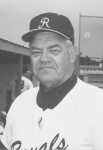A Royal ending -- Walborn retires

The Royals' dugout will be silent this year.
Soapy Walborn has retired as manager of the Mountain Home American Legion Baseball team, and with his retirement ends an era in local baseball -- one marked by championships, but more importantly for Walborn, the development of young men who have carried the discipline and self confidence he gave them into their adult lives.
With Walborn's retirement baseball for older youths now moves to the newly created Senior League of the local Babe Ruth youth baseball program. The Royals, which Walborn has led since 1988 as the final chapter in a 53-year career in coaching the basepaths, are no more.
Walborn began playing baseball in the 1940s as a kid, a time when every town had a semi-pro team that drew communities together for fun, entertainment and fellowship. He played high school ball in Pearl Harbor, Hawaii, and Souix Falls, Wash.
He joined the Air Force and in 1951 took over the coaching duties for the Scott AFB team, leading it to the championship of the USAF Training Command and placing second in the overall Air Force championship.
"Wherever I went in the service," he said, "I coached."
Assigned to Mountain Home AFB in the mid-70s where he was the ops group commander, the demands of that job didn't allow him the time to coach full-time, but he still spent time helping ballplayers learn the funadmentals of the game, especially hitting, which was his main area of expertise.
In 1980, Walborn retired and started coaching Little League teams in MountainHome.
In 1988 he took over the Royals, the Legion Baseball program, which went a dismal 2-25 that season. It was the last time the Royals had a losing season.
The sense of discipline he gave the team, and the technical skills he taught the players, led to a district championship in 1989, and the first of four state championships in 1990. The Royals also took the state title in 1993, 1994 and 2002. They won the league championship 14 times during his tenure and were a perennial powerhouse in Class B Legion baseball. Nine of his players from the Royals were drafted by pro baseball teams and placed on minor league teams.
But the championships were gravy. It was working with the kids that Walborn enjoyed the most.
"I wouldn't yell at them. I always tried to give them self confidence. I never put them down," he said. "I think that's why a lot of them played better for me than they had played for other teams."
What he enjoyed the most, he said, was "seeing the kids achieve more than they thought they could achieve. I always wanted them to be as good as they were capable of being, and to develop a positive attitude," things that would stay with them throughout their lives, whether or not they continued to play baseball.
"I got the kids to expect to win. I told them if you work hard enough at it, and believe in me and the team, we'll succeed."
Walborn said his strengths were always the fundamentals of hitting and pitching. And even though he is finally retiring, "if somebody asks for help, I'll do it until the day I die."
But it was the discipline, learned in his long career in the military, that perhaps made the most difference. Walborn said he always had four rules:
1. Do what's right.
2. Do your best.
3. Treat others as you would like to be treated.
4. No earrings.
He admitted it was easier to instill those virtues in the earlier days of his career coaching the Royals than it had been toward the end. "It seems like they were more willing to listen then, to accept authority." As the years went by, and society and teen attitudes changed, it got harder to keep some of the kids in line with those "old fashioned" virtues -- and fewer parents supported them as well. Still, he managed to do it, although the battle to do it, and his own increasing age, eventually began to wear on him, and this winter Walborn decided it was time to finally hang up his cleats.
He did so with some regrets, but also with a sense of pride in what he and his players had accomplished over the years.
"I never let go of the kids," he said, noting with pride that he stays in touch with many of his players years after they have left his program.
"I've always believed there were four levels of achievement -- fall off the boat, exist, make a living, or make a difference. I've always been proudest of those who made a difference.
"Some day, I'll die and go to the pearly gates, and when St. Peter asks me what I did, I'll say I made a difference" in the lives of the young men he coached.
